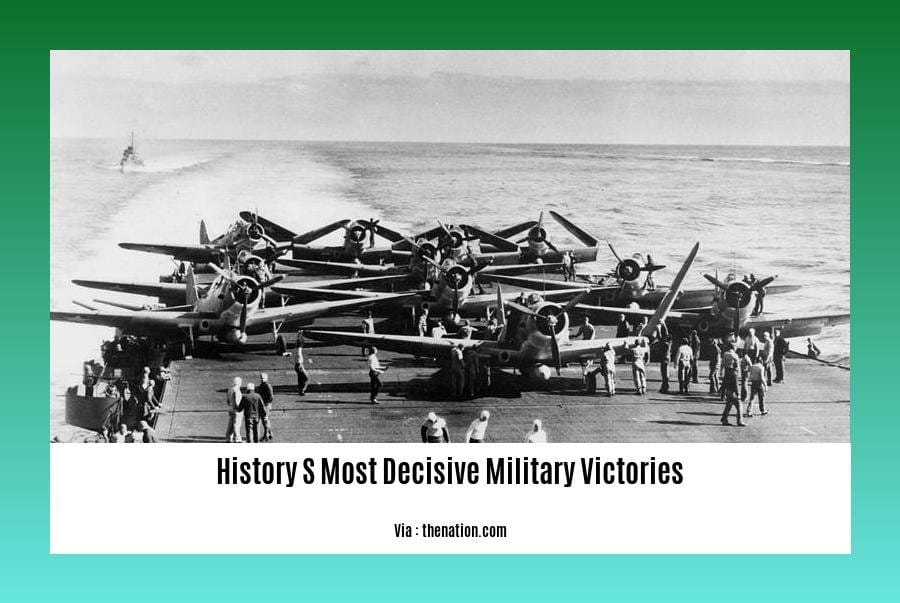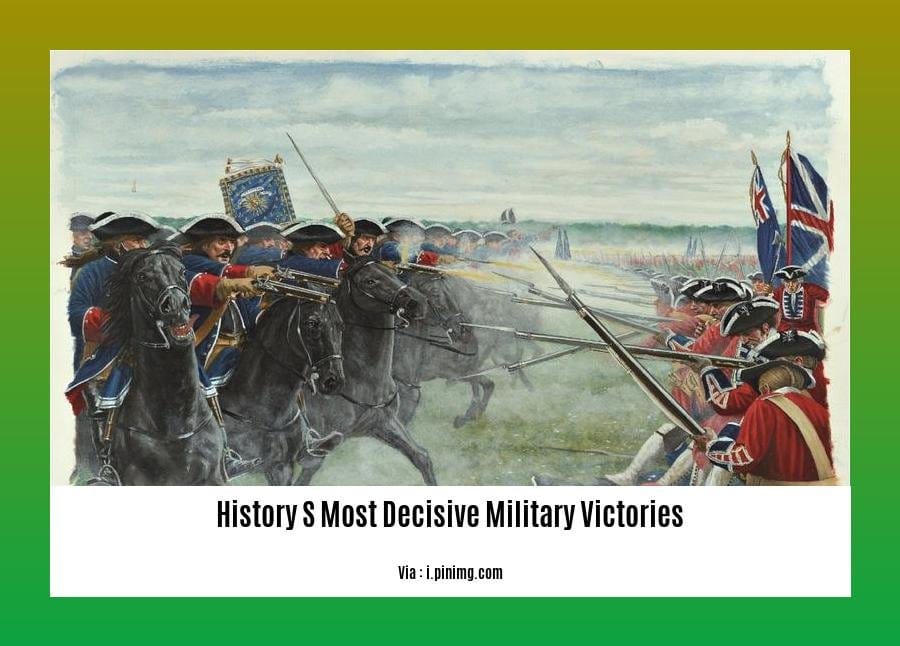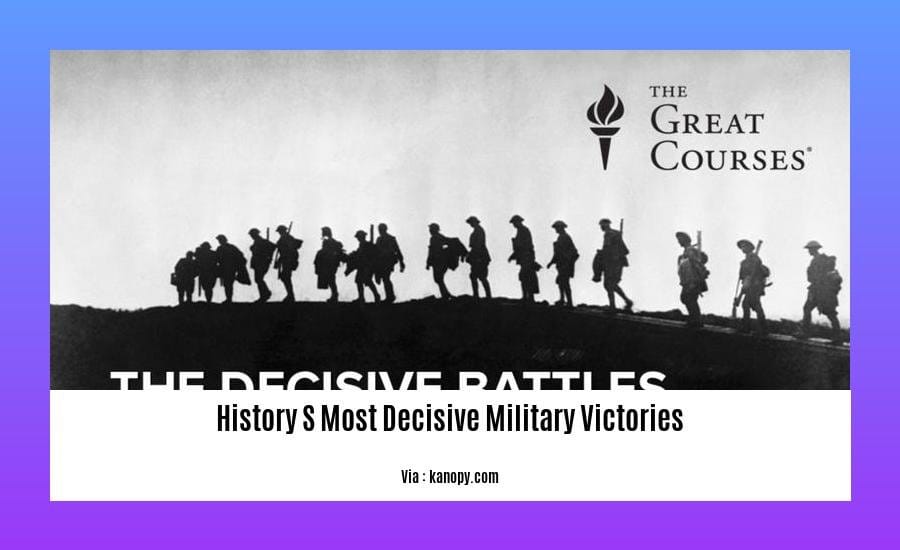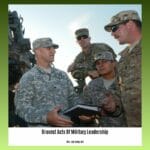Join us as we embark on an enthralling exploration of history’s most decisive military victories. Through the annals of time, battles have shaped the destinies of nations, leaving lasting legacies that continue to captivate us today. In this riveting journey, we’ll unravel the strategies, innovations, and human drama that forged these pivotal moments, forever altering the course of civilizations. Get ready to witness History’s Most Decisive Military Victories: Unraveling the Strategies and Legacies That Shaped Civilizations.
Key Takeaways:

- Historian Edward Shepherd Creasy identified 15 battles that decisively shaped world history, from Marathon (490 B.C.) to Waterloo (1815).
- These battles played pivotal roles in shaping ancient Greece, Rome, medieval Europe, and America.
- Creasy’s work, “The Fifteen Decisive Battles of the World,” continues to influence military history studies.
History’s Most Decisive Military Victories
What Do We Mean by Decisive?
These decisive triumphs drastically influenced the global stage, affecting everything from politics to societal structures. They left a lasting legacy, shaping the destiny of nations.
A Closer Look at History’s Turning Points
- Battle of Marathon (490 BC): Athenian Triumph Over Persian Invasion
Preserved Greek democracy and laid the foundation for Western civilization.
Battle of Cannae (216 BC): Hannibal’s Masterpiece Outwits Rome
Highlighted the Romans’ vulnerability and marked a turning point in the Punic Wars.
Battle of Hastings (1066): Norman Conquest Reshapes England
Ushered in a new era of Norman rule, transforming society and politics.
Battle of Lepanto (1571): Christian Victory Halts Ottoman Advance
Marked the beginning of Ottoman naval decline and safeguarded Europe from invasion.
Battle of Waterloo (1815): Defeat of Napoleon Restores Stability
Ended Napoleonic Wars and ushered in a period of relative peace in Europe.
Battle of Midway (1942): US Navy’s Victory Turns the Tide of World War II
- Crippled Japanese naval power and paved the way for Allied triumph.
Unveiling the Strategies and Legacies
These history’s most decisive military victories offer valuable lessons about strategy, leadership, and the enduring impact of military success. They stand as testaments to the human spirit’s ability to overcome adversity and shape the course of history. By studying these pivotal battles, we gain a deeper understanding of the complexities of war and the profound impact it has on civilization.
From the annals of warfare, we can learn from the military commanders celebrated for their decisive victories. History is full of tales of greatest military conquerors and their triumphs, but it also remembers the unequivocal military commander successes and routs that shaped the course of history.
Battle of Hastings (1066): Norman invasion and conquest of England
Let’s travel back in time to October 14, 1066, and witness one of history’s pivotal battles—the Battle of Hastings. This clash between the Norman army led by William, Duke of Normandy, and the Anglo-Saxon forces under King Harold Godwinson forever altered the course of English history.
The Norman Conquest, as this victory came to be known, brought about significant political, administrative, and social changes that shaped England’s destiny. William’s triumph marked the end of Anglo-Saxon rule and the beginning of a new era under Norman dominance.
Key Takeaways:
- The Battle of Hastings concluded the Norman invasion of England, initiated on September 28, 1066.
- The Norman victory led to the coronation of William as the first Norman king of England on Christmas Day, 1066.
- The Norman Conquest profoundly impacted English society, language, and culture.
Source: Britannica, Norman Conquest
Battle of Lepanto (1571): Christian victory over Ottoman Empire
Key Takeaways:
- In the Battle of Lepanto, fought on October 7, 1571, the Christian Holy League decisively defeated the Ottoman Empire in a major naval battle.
- Pope Pius V formed the Holy League in response to the Ottoman Empire’s siege of Famagusta in Cyprus.
- The battle took place in the Gulf of Patras and involved over 400 galleys.
- The Christian Holy League’s victory halted the Ottoman Empire’s naval expansion into the Mediterranean Sea.
- The outcome confirmed the division of the Mediterranean Sea, with the eastern part under Ottoman control and the western part under Spanish and Italian control.
Citation:
Battle of Midway (1942): US victory in the Pacific, turning point of World War II
The Battle of Midway, fought in June 1942, was a pivotal naval clash between the United States and Japan in the Pacific Theater of World War II. It marked a decisive turning point in the war, shifting the balance of power in the Pacific and leading to the eventual Allied victory.
A Strategic Masterstroke
The US Navy, after breaking Japanese communication codes, anticipated the Japanese attack on Midway Atoll. They deployed their aircraft carriers and submarines to intercept the Japanese fleet.
The Battle Unfolds
On June 4, 1942, the Japanese launched their attack, aiming to capture Midway and cut off Allied supply lines. However, the US Navy, using their intelligence advantage, had already positioned their forces to counter the attack.
A Devastating Blow
Over the next three days, intense naval and air battles raged. US aircraft carriers, armed with dive bombers, launched devastating attacks on the Japanese fleet. Four Japanese aircraft carriers were sunk, along with numerous other vessels.
Japanese Defeat
The loss of these carriers was a catastrophic blow to the Japanese Navy and marked the end of their naval dominance in the Pacific. The US victory at Midway halted Japanese expansionism and gave the Allies the initiative in the war.
Key Takeaways:
- The breaking of Japanese communication codes gave the US a significant advantage.
- The US Navy’s strategic planning and coordination enabled them to anticipate the Japanese attack.
- Japan’s loss of aircraft carriers crippled their naval power and turned the tide of the war.
- The Battle of Midway was a resounding victory for the Allies and marked a turning point in World War II.
Relevant URL Source:
- Battle of Midway (HISTORY)

FAQ
Q1: What are the 15 decisive battles identified by Sir Edward Shepherd Creasy?
A1: The 15 battles identified by Creasy include the Battle of Marathon, Battle of Salamis, Battle of Gaugamela, Battle of the Metaurus, Battle of Alesia, Battle of Adrianople, Battle of Châlons, Battle of Tours, Battle of Hastings, Battle of Orléans, Battle of Lepanto, Battle of Blenheim, Battle of Saratoga, Battle of Valmy, Battle of Waterloo, and Battle of Marne.
Q2: What is the significance of the Battle of Hastings?
A2: The Battle of Hastings in 1066 marked the Norman Conquest of England and had a profound impact on English history. It led to the establishment of a new ruling class, the introduction of the Norman feudal system, and significant changes in language, culture, and governance.
Q3: What were the key factors that contributed to the Ottoman defeat at the Battle of Lepanto?
A3: The Ottoman defeat at Lepanto was primarily attributed to several factors, including the superior tactics of the Holy League forces, the use of galleasses by the League, and the skillful deployment of naval artillery.
Q4: How did the Battle of Midway alter the course of World War II?
A4: The Battle of Midway was a turning point in the Pacific Theater of World War II. It marked the end of Japanese naval dominance, crippled their carrier fleet, and gave the United States the strategic initiative. It paved the way for the US’s island-hopping campaign and ultimately contributed to the Allied victory in the Pacific.
Q5: What is the main takeaway from Creasy’s work, “The Fifteen Decisive Battles of the World”?
A5: Creasy’s work emphasizes the importance of analyzing and understanding historical battles to gain insights into military strategy, the factors that influence outcomes, and the impact of decisive victories on the course of civilizations.
- Unlock Water’s Symbolism: A Cross-Cultural Exploration - April 20, 2025
- Identify Black and White Snakes: Venomous or Harmless? - April 20, 2025
- Unlocking Potential: Origins High School’s NYC Story - April 20, 2025















